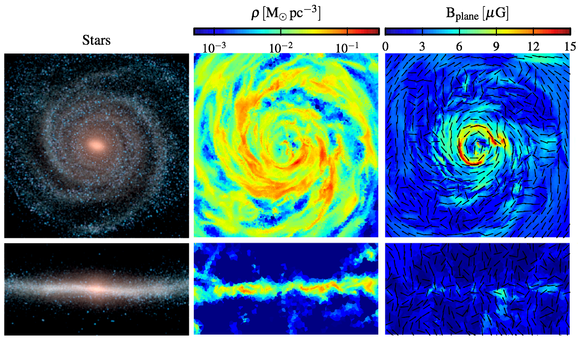EXAMAG

The EXAMAG project (“Exascale simulations of the evolution of the universe including magnetic fields”) within the SPPEXA network of the DFG aims to take crucial steps towards physically much more self-consistent simulations of cosmic structure formation, beginning soon after the Big Bang and ending with the formation of realistic stellar systems like the Milky Way. This is a multi-scale, multi-physics problem of vast proportions. It requires the development of new numerical methods that excel in accuracy, parallel scalability, and physical fidelity to the processes relevant in galaxy formation. To this end a new moving-mesh technique for hydrodynamics recently developed by us provides a significant opportunity to improve the accuracy and flexibility of methods commonly employed in astrophysical fluid dynamics. Building on the first successes with the new moving mesh code AREPO, we work on further extending this numerical framework with the goal of producing an internationally leading application code for the upcoming large computing platforms. We pursue an interdisciplinary effort of astrophysicists at HITS and applied mathematicians at the University of Würzburg, aiming to drastically improve the raw performance and scalability of our existing AREPO code. New powerful schemes for solving partial differential equations on moving meshes will be developed by us and implemented in the code in order to allow inclusion of further physics in the models. The ultimate goal are transformative simulations of individual galaxies and galaxy clusters with several tens of billion hydrodynamical resolution elements and full adaptivity.
Principal investigators:
- Prof. Dr. Christian Klingenberg
Institut für Mathematik, Universität Würzburg
Email: klingenberg@mathematik.uni-wuerzburg.de
Phone: +49 (0)931 318 5045 - Prof. Dr. Volker Springel
Heidelberg Institute for Theoretical Studies, and Heidelberg University
Email: volker.springel@h-its.org
Phone: +49 6221 533 241
Participants:
- Christian Klingenberg
- Gero Schnücke
- Pablo Gallego
- Yinhua Xia
- Volker Springel
- Kevin Schaal
- Ruediger Pakmor
About HITS
HITS, the Heidelberg Institute for Theoretical Studies, was established in 2010 by physicist and SAP co-founder Klaus Tschira (1940-2015) and the Klaus Tschira Foundation as a private, non-profit research institute. HITS conducts basic research in the natural, mathematical, and computer sciences. Major research directions include complex simulations across scales, making sense of data, and enabling science via computational research. Application areas range from molecular biology to astrophysics. An essential characteristic of the Institute is interdisciplinarity, implemented in numerous cross-group and cross-disciplinary projects. The base funding of HITS is provided by the Klaus Tschira Foundation.